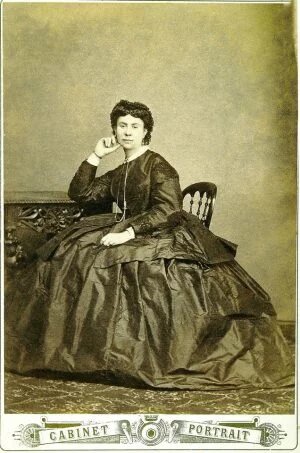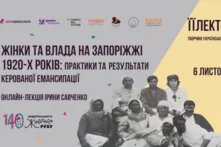

With the biography of Hanna Barvinok (1828-1911; literary pseudonym of Oleksandra Kulish from the Bilozerska household), one can study the entire history of our social life at that time. . Even though Hanna Barvinok is associated chiefly only with the name of her husband, Panteleimon Kulish, her literary identity, cultural asceticism, and active social work characterize her as a tireless enthusiast of the native word, an authoritative social leader, and a significant representative of two generations who influenced the birth of the Ukrainian women's movement.
A meeting in Motronivka with Panteleimon Kulish in January 1843, organized by her brother Vasyl Bilozersky, was fateful for Oleksandra. After three years of passionate love, the couple finally received their mother's blessing and married. Taras Shevchenko was the senior best man at the Kulish wedding, entertaining the guests with his speeches and folk songs, and becoming a close friend of the family forever.
From the beginning of married life, Oleksandra Kulish will face difficult trials: her husband’s political arrest and exile to Tula, the stillbirth caused by emotional distress, a prolonged depression, recurring marital crises and his extramarital affairs, as well as her wandering from one city to another—all of this, after a long period of emotional turmoil, eventually gave way to a more stable family life for the Kulish couple, which settled into a rustic domestic idyll in Motronivka (later renamed Hannyna Pustyn and Kulishivka).
Hanna Barvinok devoted 50 years of her career to Ukrainian literature, becoming the first Ukrainian writer and being several years ahead of Marko Vovchok. Although the latter's “Folk Stories” were published in 1858, Hanna Barvinok began her work as early as 1847, but she could not publish immediately due to certain life circumstances. Her literary mentor, as well as the creator of her pseudonym, was Panteleimon Kulish.
After her husband's death, Hanna Barvinok devoted herself entirely to popularizing and perpetuating his legacy, involving nearly all prominent cultural figures of the time, she undertook efforts to establish a museum dedicated to Panteleimon Kulish, to publish a complete edition of his works, to print the Ukrainian translation of the Bible, to recover Kulish’s manuscripts, to promote his iconographic memorialization, and to compose memoirs about him.
Although Hanna Barvinok did not belong to any women’s organization or group, her literary work, contributions to feminist publications such as the women’s almanac“The First Wreath” and the journal “Our destiny”, as well as her close friendship with Natalia Kobrynska, positioned her as a forerunner of the Ukrainian women’s movement and, eventually, as an active participant in it. She became a mentor to an entire generation of young women writers—including Natalka Poltavka, Nadiia Kybalchych, and Liubov Yanovska.
Noble and modest throughout her life, Hanna Barvinok never sought to place herself above others, neither in family life, public affairs, nor the literary sphere. For her, the highest priority was always the triad of 'husband' (as she affectionately called her spouse), God, and Ukraine. Yet fate and her life’s path ordained otherwise: she remained the most critical person in Kulish’s life, became the first Ukrainian woman writer to speak in the language of her people, and was the first to pave the way for her fellow women in both public and literary spheres.
The translation from Ukrainian was created with the help of DeepL
Listen to full lecture in Ukrainian





